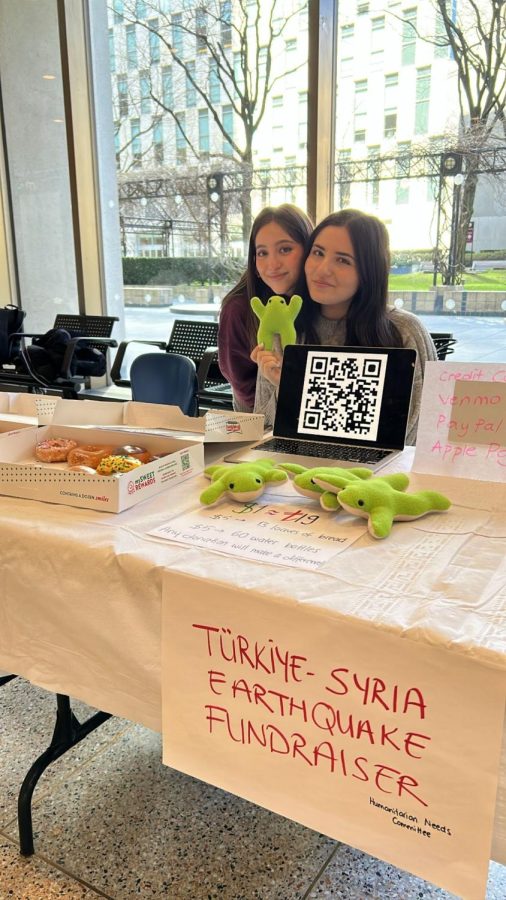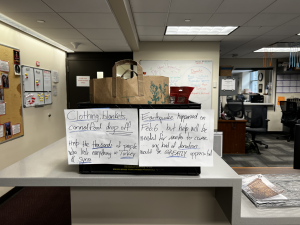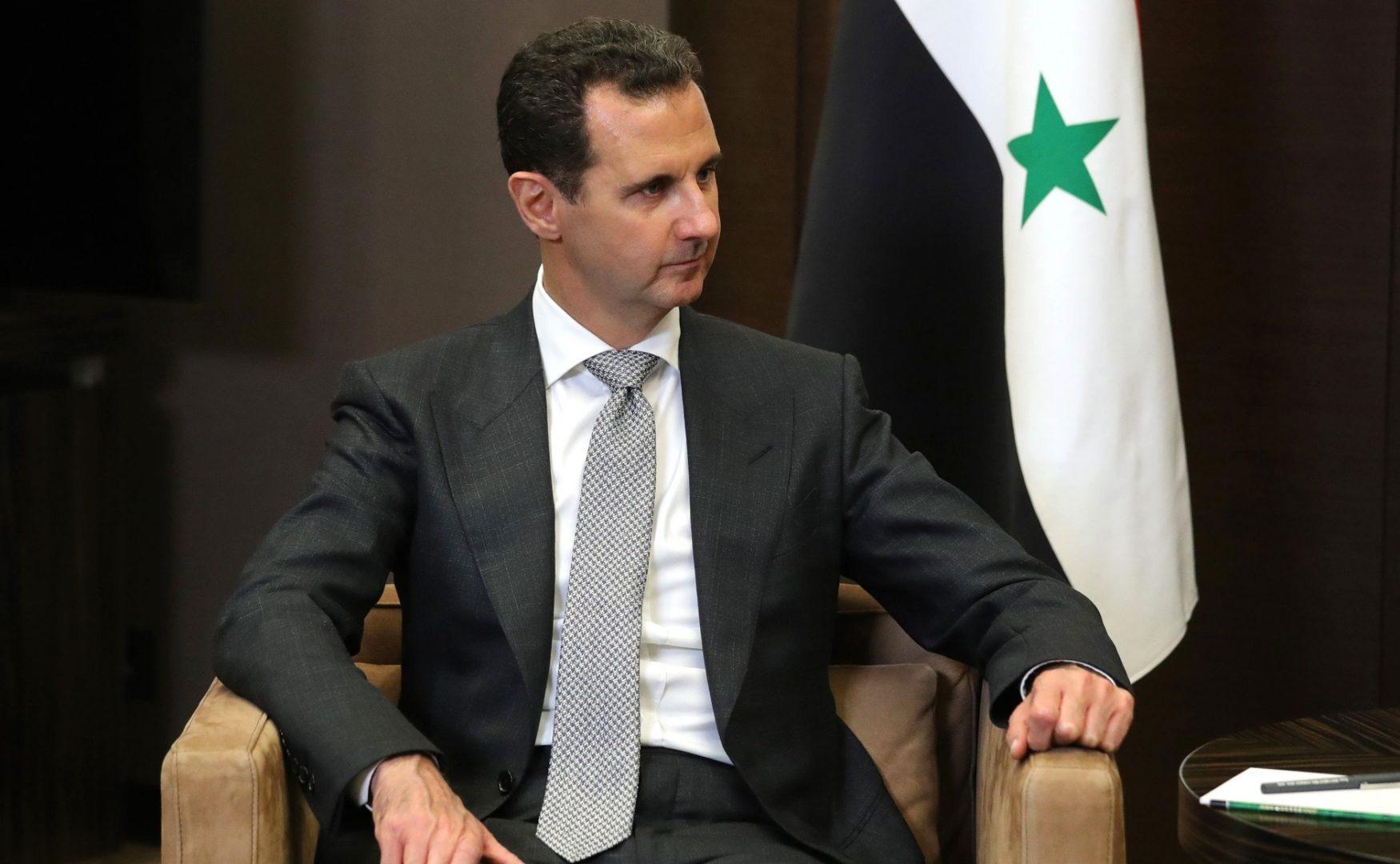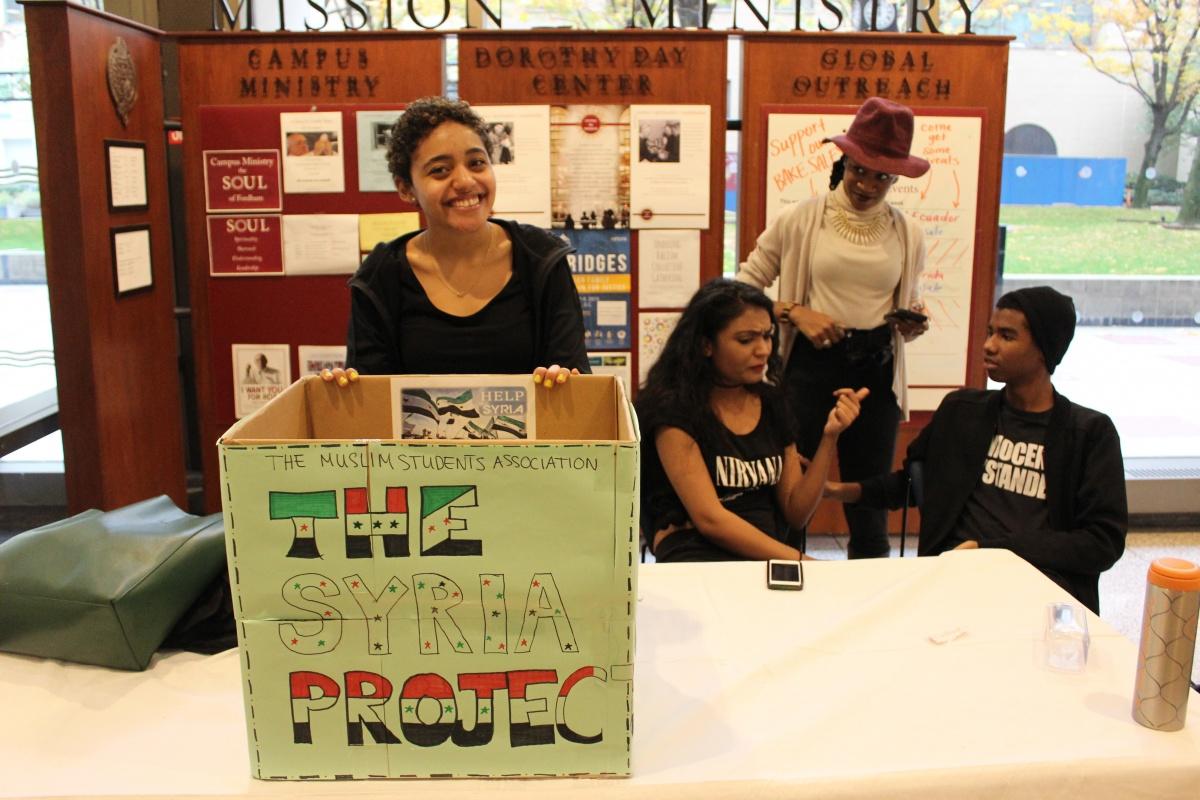New Club Supports Survivors of Türkiye and Syria Earthquakes
Members of the recently established Turkish Students Association reflect on their organizing relief efforts and becoming a university-sanctioned club
COURTESY OF TSA
The TSA club tables in the Lowenstein Center to raise donations for survivors of the earthquakes in Türkiye and Syria.
April 12, 2023
Some names in this article have been protected based on a media advisory from Student Press Law Center on April 4, 2025
The Turkish Students Association (TSA) has led support efforts at Fordham University for survivors in Türkiye (the recently adopted name for the Republic of Turkey) and Syria in the aftermath of the Kahramanmaras earthquakes. The devastation — a series of three 7.8, 7.7 and 6.3 magnitude quakes that occurred on Feb. 6 and Feb. 20 — resulted in almost 50,000 lives lost and more than 164,000 collapsed buildings.
Within 10 days of the first earthquake, students of Turkish descent formed an ad hoc committee focused on collecting and distributing humanitarian aid. Since the committee’s formation on Feb. 16, its members have hosted fundraisers and participated in volunteer work in coordination with both the United Student Government at Lincoln Center (USGLC) and the Turkish Consulate General in New York City.
TSA became a university-sanctioned club on March 22, allowing it to receive funding from the Student Activities Budget Committee, table and post flyers around campus, among other privileges.
A member of Fordham College at Lincoln Center (FCLC) ’24, is serving as the chair of USGLC’s Committee on Humanitarian Needs and vice president of TSA. As a Turkish American, she was inspired to work with other Turkish students in forming TSA after learning how many of her friends’ families were directly affected by the earthquakes.
“It was just upsetting to see the response to the earthquake and how people in America were reacting to it, because it felt like nobody cared,” she said. “I wish there was more I could do, but it’s painful to see that from here and not being able to support on the ground.”
The first members with whom she worked were Baris Karamanoglu, Gabelli School of Business at Lincoln Center (GSBLC) ’25; Lara Akçakaya, GSBLC ’25; Selen Tavli, GSBLC ’23; Sena Sari, FCLC ’26; Yasemin Cem, FCLC ’25; and Zeynep Helva, FCLC ’26. On Feb. 13, the students held a meeting with USGLC to discuss the formation of a group on campus that would address the demands of Turkish students. Three days later, she was voted as chairperson of the committee.
As of April 12, TSA has raised $3,089, or about 60,000 Turkish lira, in donations for Turkish Philanthropy Funds (TPF), a nonprofit dedicated to Turkish and Turkish American communities.
As of April 12, TSA has raised $3,089, or about 60,000 Turkish lira, in donations for Turkish Philanthropy Funds (TPF), a nonprofit dedicated to Turkish and Turkish American communities. Efforts to raise money included TSA’s sale of plushies and baked goods, as well as flyers set up around campus.
The vice president of TSA noted that while she appreciated USGLC’s support, she felt that the Fordham administration should have officially recognized the club sooner than it did.
Tavli, secretary of TSA, was born and raised in Istanbul and felt motivated to organize support and help after seeing a lack of response to the disaster from the university.
“I told my Fordham Turkish friends that we also need to do something,” she said. “Like ‘We can’t just sit here and do nothing. Let’s ask the school or talk to someone. Let’s start a club!’”
She noted the discrepancies between Fordham and other universities in New York City regarding the administrations’ responses to the earthquakes, as the latter supported and made significant contributions to Turkish student-led groups.
Aside from her friends at Fordham, she was also acquainted with Turkish students at Pratt Institute. She noted the discrepancies between Fordham and other universities in New York City regarding the administrations’ responses to the earthquakes, as the latter supported and made significant contributions to Turkish student-led groups.
Nearby universities such as the NYU Turkish Culture Association and the Columbia Turkish Association have raised over $80,000 in donations and $20,000 in donations respectively, with Columbia matching corporate contributions.
TSA’s vice president attributed such disparities to “barriers” presented by the Fordham administration that prevent any emergency fundraising by student organizations, something she found “frustrating.”
These barriers include limited use of third-party apps to raise money, including Venmo or PayPal, because Fordham requires clubs to provide tax forms and a signed statement due to liability concerns. To circumvent this, TSA accepted donations through the personal Venmo account of Sari, treasurer of TSA, and the donation link found in the club’s Instagram, both of which were directly linked to TPF.
“I’m grateful for the point that we got to, but it was upsetting to see other communities being able to help quicker than we were just because we had so many internal issues,” she said.
For Sari, the connection to home and the desire to help her community were pertinent for her. Like Tavil, she was born and raised in Istanbul and made the decision to pursue an education in New York at age 19, becoming the only member of her family to live outside of the country.
She recalled being told by a former classmate in Türkiye that her teacher, along with the teacher’s husband and their two children, lost their lives to the earthquakes. She said she felt “disconnected from reality” because she had no one to relate to or share this experience with.
“The Middle East in the last decade or so has had a lot of catastrophic events, and I think people forget sometimes that people there are human too, with real emotions and real experiences.” The vice president of TSA
At the Turkish Embassy, Sari had been working with classmates and Turkish compatriots to pack basic necessities, including winter clothing, food, feminine hygiene products and baby items, for families in Türkiye. She said her volunteer experience played a contributing role in maintaining regular contact with the Turkish community, which, in turn, uplifted her emotional well-being.
“I found my community better because people were also going through this grieving and (had the) same emotions as me,” she said.
The vice president of TSA aims to coordinate with the student government in organizing more fundraising events this semester. She also urged Fordham faculty and students to contribute financially by giving their attention to the events in Türkiye and the Middle East.
“The Middle East in the last decade or so has had a lot of catastrophic events, and I think people forget sometimes that people there are human too, with real emotions and real experiences,” TSA’s vice president said.
Information regarding the committee — as well as resources to donate — can be found on TSA’s Instagram, @fordhamtsa.















